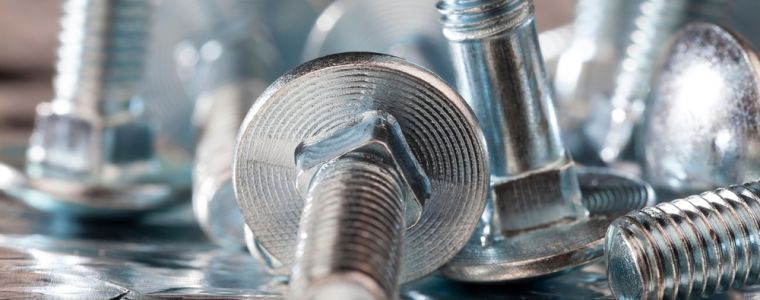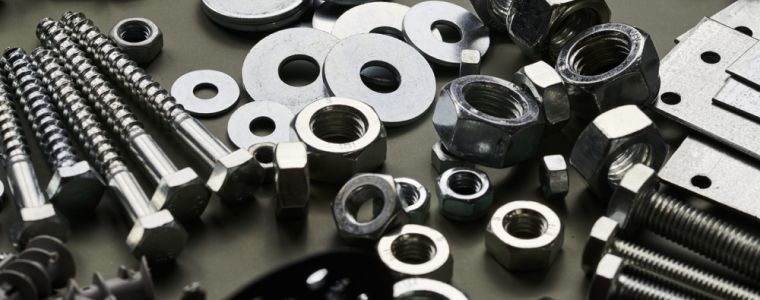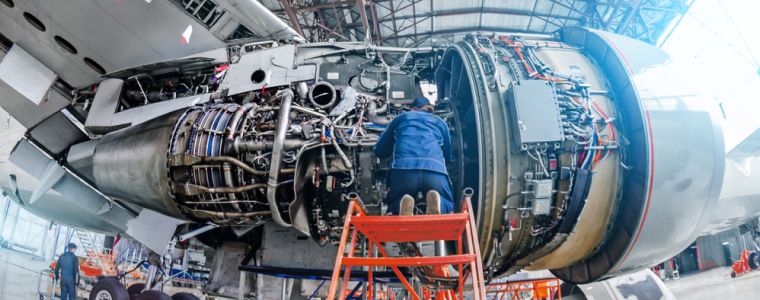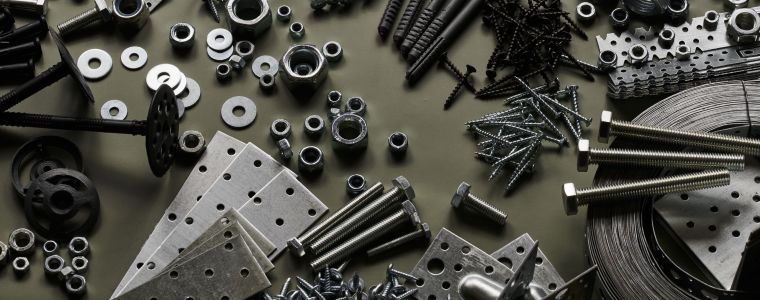Aerospace Fasteners: Types, Qualities and Materials

What are Aerospace Fasteners?
The aerospace industry uses an array of fasteners, many of which fall under the category of aircraft general spares (AGS). These play a crucial role in securely assembling components, including commercial aeroplanes, military aircraft, jets, ballistic missiles and rockets.
Aerospace Fasteners
Pins: Play a pivotal role in ensuring the structural integrity and safety of components by securely connecting critical parts.
Rivets: Primarily employed to securely connect multiple metal sheets, plates or other materials.
Screws: The most widely used aerospace fastener. They resemble bolts with their external thread, yet are pointier with a ridge-like shape and a higher helix.
Collars: These fasteners are designed to integrate smoothly with lock bolt rivets. Collars assist in fixing the rivet or bolt securely to an object and are constructed with metal alloys to ensure compatibility and durability.
Nuts: Fastener nuts come in materials like cadmium-plated carbon steel, stainless steel, or anodised 2024T aluminium alloy. They are used alongside a corresponding bolt or screw and are categorised into two types: non-locking and self-locking, each serving specific purposes in the aerospace industry.
Bolts: Crafted from materials like unplated corrosion-resistant steel, zinc-plated corrosion-resistant steel, cadmium, or anodised aluminium alloys, these components are built for durability and resilience. Popular bolt types include MS bolts, close tolerance bolts, NAS internal wrenching bolts, and AN bolts, each chosen for their specific strengths and suitability for aerospace applications.
Choosing High-Quality Fasteners

Specialist alloy fasteners have been developed to meet the exacting standards required by the aerospace industry. The main requirements are:
High Performance: Aerospace fasteners must withstand intense operating environments.
Withstand Extreme Conditions: Fasteners should be able to endure extreme pressures and dramatic temperature fluctuations.
Durability and Corrosion Resistance: Crucial for operating in wet and cyclic conditions, preventing corrosion or oxidation.
High Strength: Built to withstand immense stresses and pressure in service, including high tensile and shear strength for the operating environment and good fatigue strength for dynamic loads from turbulence.
Lightweight Design: An average aircraft contains over 1 million fasteners; reducing weight impacts overall aircraft performance and running costs.
Mandatory Certifications for Manufacturers: Companies manufacturing or supplying aerospace components must obtain AS9100 or AS9120 certification.
Third-Party Certification Process: Certification involves a third-party review of compliance with the AS9100 family standard.
Regular Audits for Accreditation Maintenance: To maintain accreditation, companies are required to undergo and pass regular third-party audits.
Use of Specialist Alloys: Fasteners in the aerospace industry are made from specialist alloys to meet stringent standards.
Aerospace Fasteners Materials

Titanium
Titanium alloys are stronger than steel, considerably lighter and have good thermal stability and corrosion resistance. A high cost inhibits utilisation as a replacement for aluminium or steel fasteners in all applications.
Aluminium
Aluminium is a classic aerospace material due to its lightweight, good strength-to-weight ratio and corrosion resistance.
However, aluminium isn’t as strong as steel, and to reach acceptable performance for aerospace use it must be cold-formed and undergo additional surface treatments. Whilst these processes increase its strength and corrosion resistance, aluminium remains highly sensitive to dramatic temperature changes – and doesn’t operate well above 125OC.
Steel
Stainless steel and various grades of steel-based alloys typically feature greater strength than other materials. Steel also requires certain treatments to make it resistant to heat and corrosion. However, this extra strength comes at a cost as steel is heavier than titanium or aluminium.
Normally when steel is used for aerospace applications, it is stainless steel or specific steel alloys. Certain steel alloys are susceptible to heat damage, which makes it critical that the correct type of stainless steel is chosen for the specific requirements of its application.
Special Alloys

The aerospace industry is a major driver of innovation and has contributed enormously to material science. Numerous special alloys offer higher strength, less weight, better thermal stability and a longer operating life that may outperform the materials discussed above.
Some of the more common alloys used for aerospace fasteners include:
A 286:: This is an iron-nickel-chromium alloy with corrosion, oxidation resistance, and high strength. Operating temperature range from 215°C to 649°C. A 286 is useful in engines, turbines and superchargers.
H-11: A chromium steel alloy with low carbon, a high surface hardness and high impact resistance. It is useful in structural and high-stress components.
Inconel® 718: A nickel-based superalloy with an ultimate tensile strength of 1100 MPa at 650oC.
Monel®: Is a family of nickel-copper alloys with corrosion resistance and high tensile strength. It is usually used in structural components, combustion, and exhaust equipment.
Waspaloy®: This is a nickel-based superalloy with oxidation resistance and high corrosion resistance.
MP35N®: A nickel-cobalt alloy with high tensile strength, corrosion resistance, and surface hardness. It is ideal for structural components.
Fastener Solutions: Aerospace Fastener Covers
Fastener covers are essential for commercial aeroplanes, providing additional protection against various environmental and atmospheric factors. Each of these materials is selected for its specific ability to endure extreme environments, ensuring the durability and integrity of aerospace equipment:
Cadmium
Black Oxide
Zinc
Nickel
Silver
Phosphate
Aerospace Versus Commercial-Grade Fasteners

On the surface commercial-grade fasteners may look similar to aerospace fasteners, however, a commercial-grade fastener will not survive long if used in an aerospace application.
The materials used for aerospace fasteners are high quality and manufactured to a specific standard. Commercial-grade fasteners are commonly manufactured from low-to-medium carbon steel. Fasteners in aerospace undergo special treatments to be more resistant to heat and corrosion.
Aerospace fasteners have a tensile strength above 800 MPa, and commercial fasteners are typically below 400 MPa.
Since aircraft are subject to strong vibrations, there is a risk of fasteners loosening. To combat this, many aerospace fasteners have self-locking mechanisms. In addition, blind bolts and lock bolts are required for aerospace due to the complexity of aircraft construction.
Owing to the additional functionality and enhanced properties, aerospace fasteners are more expensive than commercial-grade fasteners.
Selecting the correct aerospace fastener for its application is crucial. It significantly affects the mechanical performance and longevity of a component, influencing both maintenance needs and financial expenses. For expert support and technical guidance, get in touch.
Blogs of interest:
Inconel Alloy 625 Vs Inconel Alloy 718
Introduction to the Structure and Properties of Metal Alloys
FAQs
What professions and industries use fasteners?
Fasteners play a critical role across a wide range of professions and industries. Here’s a look at some of the key sectors where fasteners are indispensable:
Construction Industry: From residential buildings to skyscrapers, fasteners are crucial for joining materials and ensuring structural integrity.
Automotive Sector: In the manufacturing of vehicles, fasteners are used extensively to assemble everything from engines to interiors.
Aerospace and Aviation: Fasteners are vital in building and maintaining aircrafts, ensuring safety and durability under extreme conditions.
Electronics Manufacturing: Small, precise fasteners are used in the assembly of electronic devices, from smartphones to computers.
Shipbuilding: In marine environments, fasteners must withstand harsh conditions, making them essential in the construction of ships and submarines.
Machinery and Heavy Equipment: Fasteners are key in assembling industrial machinery and heavy equipment used in mining, agriculture, and manufacturing.
Medical Industry: Specialised fasteners are used in medical equipment, ensuring reliability and precision.
Furniture Manufacturing: Woodworking and furniture making rely on fasteners for structural support and design.
Railway Systems: Rail construction and maintenance use various fasteners for track laying and assembling railcars.
Energy Sector: In renewable and non-renewable energy industries, fasteners are used in building and maintaining infrastructure like wind turbines and oil rigs.
Defence and Military: Military equipment, vehicles, and infrastructure require robust fasteners for durability and security.
Plumbing and HVAC: Fasteners are essential in installing and maintaining heating, ventilation, and plumbing systems.
What are all the important standards in fasteners?
Companies manufacturing or supplying aerospace components are required to secure AS9100 or AS9120 certification. This process entails an independent third-party evaluation to verify adherence to the standards set by the AS9100 family standard. To maintain this accreditation, these companies must consistently pass periodic third-party audits.
Where are aluminium bolts used?
Aluminium bolts, known for their lightweight and corrosion-resistant properties, have extensive use in various settings. Here are some of the key areas where these bolts are commonly used:
Aerospace Industry: Due to their strength-to-weight ratio, aluminium bolts are ideal for aircraft construction, reducing overall weight while maintaining structural integrity.
Automotive Manufacturing: In vehicles, especially in high-performance and lightweight models, aluminium bolts are used to decrease weight, which can improve fuel efficiency and speed.
Marine Applications: The corrosion resistance of aluminium makes these bolts suitable for boats and ships, where they resist the corrosive marine environment.
Construction: In architectural elements where weight and appearance are important, aluminium bolts are used for their aesthetic appeal and lightweight properties.
Sporting Goods: In the production of bicycles, golf clubs, and other sports equipment, aluminium bolts offer a balance of lightness and durability.
Electronics: For lightweight electronic devices like laptops and smartphones, aluminium bolts provide a secure fastening without adding significant weight.
Outdoor Equipment: In camping gear and outdoor structures, aluminium bolts are favoured for their lightness and resistance to weather-related corrosion.
Energy Sector: In renewable energy installations like solar panels, aluminium bolts are used for their durability and lightweight nature.
Medical Devices: For medical equipment where non-magnetic properties are essential, such as in MRI machines, aluminium bolts are a preferred choice.
Consumer Goods: In household items where weight and rust resistance matter, such as in furniture or kitchenware, aluminium bolts are often employed.
What is the strongest fastener?
Categorising the ‘strongest fastener’ varies depending on the specific application and material requirements, but generally, fasteners made of high-grade steel or titanium are considered among the strongest. These materials offer exceptional tensile strength and durability, ideal for high-stress and critical applications, such as in the aerospace, automotive and construction industries. Additionally, the design of the fastener, such as a bolt with a fine thread, can also enhance its strength and gripping power.
————————————————————————————————————————————–
Waspaloy® is the registered trademark of United Technologies Corp.
Monel® is a registered trademark of Special Metals Corporation.
Inconel® is a registered trademark of Special Metals Corporation.
MP35N® is a trademark of SPS Technologies, Inc.
